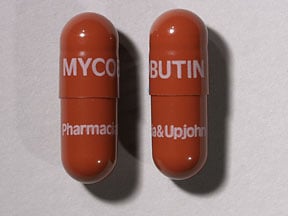
Mycobutin Coupons & Savings Card – Discount Prices from $114.81
Brand for: Rifabutin
My prescription
Edit
150MG, Rifabutin (28 Capsules)
Select pharmacy

CVS
$182.23
COUPON PRICE
Walgreens
$114.81
COUPON PRICE
Albertsons
$274.95
COUPON PRICE
Walmart
$295.35
COUPON PRICEMycobutin savings card
Show this card to your pharmacist
Walgreens
$114.81
BIN
ID
PCN
GRP
011867
LH65443740
HT
LABH001
Powered by
Related rifamycins prescriptions
More prescriptions for tuberculosis
Related rifamycins prescriptions
More prescriptions for tuberculosis
Price history for Mycobutin (brand) & Rifabutin (generic)
28 Capsules, 150MG
Average retail price for Mycobutin
Average retail price for Rifabutin
Average SaveHealth price for Rifabutin
Our price history data is based on aggregated prescription data collected from participating pharmacies in America. Our prescription data updates daily to reflect the latest price changes. If you notice a missing data point, it means there wasn't sufficient data available to generate a monetary value for that date.
Over the last 12 months, the average discount price of Mycobutin is $244.64 using the SaveHealth savings card. That's an average savings of 89.95% on Mycobutin with our discount card.
*Retail prices are based on pharmacy claims data, and may not be accurate when we don't have enough claims.
Mycobutin (Rifabutin) dosage forms
Dosage Quantity Price from Per unit 150MG 28 Capsules $182.23 $6.51 150MG 60 Capsules $369.58 $6.16 150MG 100 Capsules $611.77 $6.12
| Dosage | Quantity | Price from | Per unit |
|---|---|---|---|
| 150MG | 28 Capsules | $182.23 | $6.51 |
| 150MG | 60 Capsules | $369.58 | $6.16 |
| 150MG | 100 Capsules | $611.77 | $6.12 |
What is mycobutin used for?
Mycobutin is used to prevent Mycobacterium avium complex (MAC) in patients with advanced HIV infection. It is also used in combination with other medications to treat active tuberculosis in certain cases.
Is rifabutin the same as mycobutin?
Yes, rifabutin is the generic name for the brand name drug Mycobutin. They are the same medication.
How much does Mycobutin cost?
The cost of Mycobutin can vary depending on factors such as the pharmacy, location, and whether the patient has insurance coverage. It is recommended to check with local pharmacies or online resources for the most accurate and up-to-date pricing information. Additionally, patients may want to consult with their healthcare provider or insurance company to explore potential cost-saving options or assistance programs.
Does rifabutin have side effects?
Yes, rifabutin can have side effects. Common side effects include nausea, vomiting, diarrhea, stomach pain, and changes in taste. It may also cause a reddish-orange discoloration of bodily fluids, such as urine, sweat, and tears. Some individuals may experience more serious side effects, such as liver problems, blood disorders, or severe allergic reactions. It is important for individuals to discuss any side effects they experience with their healthcare provider.
What class of drug is mycobutin?
Mycobutin belongs to the class of drugs known as antibiotics, specifically rifamycins. It is used to treat or prevent certain bacterial infections.
